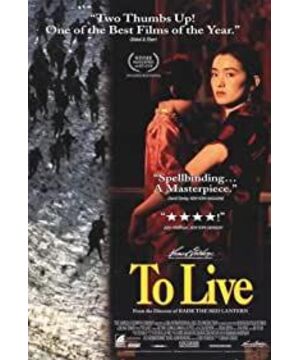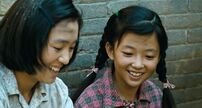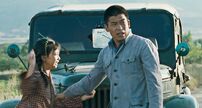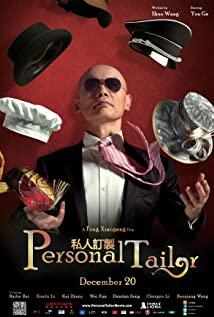"To live" is not as loud as "to live", and the word "Zhi" is read softly, as if there is no confidence, but there is a bit of tenacity. Just like the atmosphere created by this film, although it is titled "living", it does not describe the joy of life very much, but is covered with the sorrow of death, as if it is a dream that is not desired but must be dreamed. Death is the ultimate destiny of living, no one can escape, but what the director wants to say is not limited to this.
Let's take a look back at a few important deaths in the movie.
Father's death. He lost all his property due to gambling and lost his house. The whole family had to move out. The owner came to ask for the house deed. This is probably the last decent face of the old man's life. After signing the letter and getting up, he suddenly became angry, and was killed by Fugui. Afterwards, Jiazhen also took the child back to her parents' house and did not want to live with him. Fugui experienced the first despair he knew, and it was also the first turning point in his life. The concept has changed, from cynical to mature and cautious; the environment has changed, from a big house to a small shabby house; identity has changed, from a playboy to a town poor.
The death of the old. During the civil war, Fugui and Chunsheng became prisoners of the Kuomintang, and they witnessed the raging war and heavy casualties in the army. Lao Quan, who had taken good care of the two of them by chance encounter, also died in the barren mountains. Later, the Kuomintang was wiped out in one fell swoop. The Communist Party saw Fugui and Chunsheng's shadow puppet box and asked them to sing a play. Only then did they survive and become revolutionaries. Since then, Fugui has strengthened the idea that my destiny is beyond my control. Every great change in the times is helpless, but for the sake of my wife and children, and for the family, I have to live, as long as I live.
Youqing's death. In the novel, the death of son Youqing is a climax, and it is also a plot that has undergone major changes in the film. On the day of Youqing's death, the teacher told him to go to the school to make steel, and Jiazhen brought him dumplings, saying in her mouth: Twenty, Youqing eat more. Later, on Youqing's grave, Jiazhen brought him another box of dumplings and said, "I didn't eat it that day." The echo of the details brings tears to my eyes. The direct cause of his son's death was an accident, and the indirect cause was steelmaking. There is still a hint of irony here. The original book is sharp, the movie is roundabout, and the screenwriter dances in shackles, maximizing the bottom line and effect. If the expression of this meaning is completely abandoned, then there is no need to emphasize what to do at school that day. In China in the 1960s and 1970s, it was not uncommon for children to be unable to feed themselves. Although a family could have six or seven children, not all of them could be supported, or died of natural or man-made disasters. Families who have lost their young son must not only be lucky and his family, this kind of plot arrangement does not depict the fate of individuals, but a historical group portrait.
The death of Fengxia. Youqing died, and Fengxia was the only child in the family. If the tone of the whole movie "Alive" is bitter, then the character of Fengxia is a little sweet to survive. Fengxia has a hard life, but she is optimistic and kind. She had a fever and became mute when she was a child, but there was always a bright smile on her red face. She was bullied by other children, and her brother was taught by her father to avenge her. Jiazhen felt bad for her child and did not let him beat her. Seeing that the family couldn’t stand, Fengxia brought four bowls of noodles from the dining hall, and the whole family ate happily. After dinner, the conflict is resolved. The little angel grew up and married the affectionate and righteous comrade Erxi. The Fugui couple and the audience were all happy for her. However, the good times did not last long. Fengxia had a difficult labor and could not find a doctor, and died of heavy bleeding. Because the Red Guards seized power and occupied the hospital, the doctors were locked in the cowshed. So far, Fugui lost all his children.
"To live is to live itself" is a very simple sentence, and the film also grasps this tone, and tells us by narrating several deaths experienced by the Fugui family, the end point of "living itself" is death. In this process of living from death, let the audience follow the poverty, accident, down-and-out, loss, and death suffered by this family, heartbroken again and again, and moved again and again.
People of every era naturally think that the era they live in is the worst era. However, the scars left by the changes of the era can resonate at most. That's the highlight of this movie. This is not the heroism of one individual, but the epic of the entire human race.
Screenwriter Lu Wei said in "Secrets of Movie Screenwriters" that "To Live" is not a traditional drama structure, with no obvious succession and transition, but a scattered structure with life flow as the main body. But I think it's sloppy. In addition to showing the daily life of citizens in small towns, it lays out a dark line of "death" and points the question from the opposite side. Each death forms a small climax, which has a violent impact on the life of the protagonist Fugui, forming a turning point. With every death he witnessed, every loss he experienced, his bottom line took a step back. If there were some other pursuits in the beginning, such as gambling, such as shadow puppetry, they were also worn down later, as long as they were alive. What's more, in the past 60 or 70 years, it has experienced civil war, three antis and five antis, the Great Leap Forward, the Cultural Revolution, the reform and opening up, the will of the individual -- if any, it has also been pushed by the torrent of the times, interrupted again and again, once again. again. Fugui is extremely passive in it. After constantly losing, his only wish in the end is to live, which seems to be a compromise that most adults must go through in the process of adulthood. However, after experiencing loss and death again and again, the thin and old Fugui looked back on this life, and suddenly realized that he was born like an oyster, and was originally miserable. "Alive" is a moment, but not an eternal state.
View more about To Live reviews











